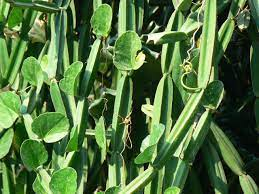TULSI (Ocimum sanctum)
The
uses of tulsi are numerous and varied, ranging from treating respiratory and
digestive disorders to reducing stress and anxiety. Let's explore some of the
most common uses of tulsi in more detail:
- Respiratory Disorders
Tulsi
is a powerful natural expectorant that helps to loosen and expel mucus from the
lungs. It is therefore useful in treating respiratory disorders such as coughs,
colds, and flu. Tulsi leaves can be boiled in water to make a tea or steam
inhalation can be done with tulsi leaves to help alleviate congestion.
- Digestive Disorders
Tulsi
is known to improve digestion and alleviate digestive disorders such as
bloating, flatulence, and constipation. It can also help to reduce nausea and
vomiting. Tulsi leaves can be chewed raw or used in cooking, or they can be
boiled in water to make a tea.
- Stress and Anxiety
Tulsi
is considered to be an adaptogen, which means it helps the body to adapt to
stress and anxiety. It can help to regulate cortisol levels, which are elevated
during times of stress. Tulsi tea or supplements are often recommended for
individuals experiencing stress and anxiety.
- Immune System Booster
Tulsi
is known to be a natural immune system booster, thanks to its antibacterial,
antiviral, and anti-inflammatory properties. It can help to ward off infections
and illnesses, and promote overall health and well-being.
- Skin Disorders
Tulsi
has antifungal and antibacterial properties, making it an effective treatment
for a variety of skin disorders. It can help to reduce inflammation, itching,
and redness, and promote healing. Tulsi leaves can be made into a paste and
applied directly to the affected area.
- Oral Health
Tulsi
is known to have antibacterial properties that can help to improve oral health.
It can help to reduce plaque and gingivitis, and prevent bad breath. Tulsi
leaves can be chewed raw or used in mouthwash.
- Diabetes
Tulsi
has been found to be effective in lowering blood sugar levels, making it a
useful natural remedy for individuals with diabetes. It can also help to reduce
cholesterol levels, which are often elevated in individuals with diabetes.
- Cancer Prevention
Tulsi
has been found to have anti-cancer properties, thanks to its ability to reduce
oxidative stress and inflammation. It may be useful in preventing the
development of cancer cells.
- Kidney Stones
Tulsi
is known to have diuretic properties that can help to flush out toxins and
reduce the risk of kidney stone formation. It can also help to reduce pain and
inflammation associated with kidney stones.
- Eye Health
Tulsi
has been found to have antioxidant properties that can help to protect the eyes
from damage caused by free radicals. It can also help to reduce the risk of
age-related macular degeneration and other eye disorders.
Tulsi tea, supplements, and essential oils are widely available and can be
easily incorporated into one's daily routine. It is important to note that
while Tulsi is generally safe for most individuals, it is always recommended to
consult a healthcare professional before using any new herbal remedy or
supplement
HAPPY BLOGGING!!!
DEEPIKA KRISHNAMOORTHY
A RESEARCH SCHOLAR




Comments
Post a Comment